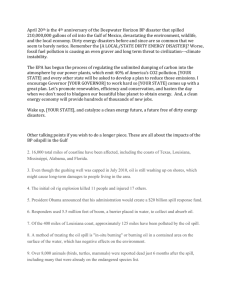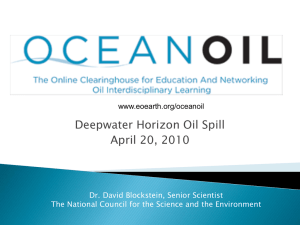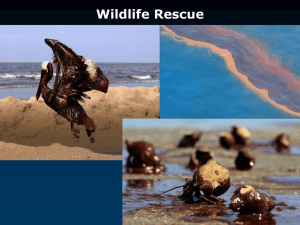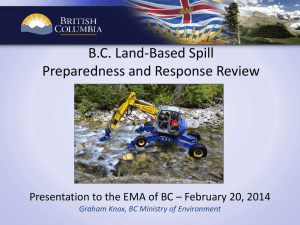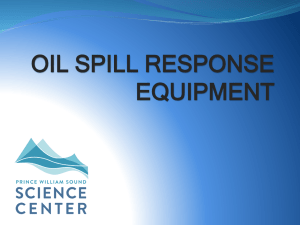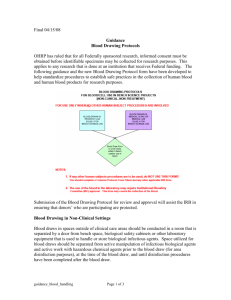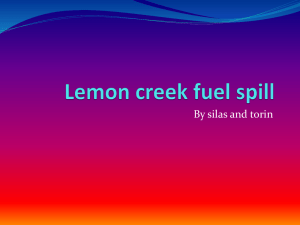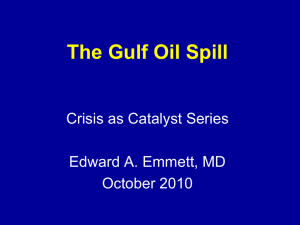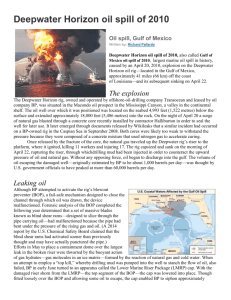Guidelines for Oil Spills - University of New Hampshire
advertisement
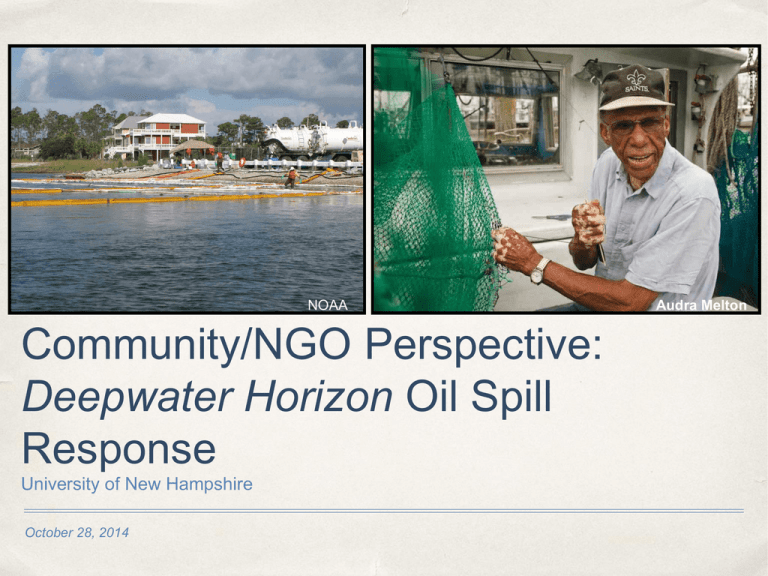
NOAA Community/NGO Perspective: Deepwater Horizon Oil Spill Response University of New Hampshire October 28, 2014 Audra Melton Dave Martin Gerald Herbert/AP Deepwater Horizon Oil Spill ✤ 11 lives lost ✤ 87 days from explosion until well was capped ✤ Estimated 4.9 million barrels spilled ✤ 88,522 square miles of fisheries closures (6/2010) ✤ More than 4.6 millions pounds of oiled material removed from coastlines in 2013 EPA Gulf oil spill 'five times' larger than estimated “US coastguard says 5,000 barrels a day of oil are spewing from a well beneath site of the Deepwater Horizon rig explosion.” The Guardian, April 28, 2010 0 1 Incident Command System (DWH) ✤ Unified Area Command in Louisiana and additional ICPs set up across Gulf. ✤ One key function of ICS is to incorporate federal, state, local and Response Personnel into response and planning activities. Mike Kittrell, al.com Volunteer Field Observer Program “…maintaining situational awareness along the Gulf Coast from Florida to Louisiana presented significant knowledge gaps, so the Volunteer Coordination Team operationalized the Volunteer Field Observer Program (VFOB). The VFOB program bolstered the Incident Management Team‘s exposure to real- time and verifiable on-scene information.” NRT Use of Volunteers: Guidelines for Oil Spills Joint Information Command (JIC) “The JIC provides a structure for developing and delivering incident-related coordinated messages. It develops, recommends, and executes public information plans and strategies; advises the IC, UC, and supporting agencies or organizations concerning public affairs issues that could affect a response effort; and, controls rumors and inaccurate information that could undermine public confidence in the emergency response effort. It is the central point of contact for all news media at the scene of an incident.” - Department of Homeland Security, National Incident Management System, December 2008. I can’t imagine losing the Gulf… We weren’t ready for this Is it safe? Who’s running the show? I don’t believe you. Affect on Communities ✤ Short and Long-term Environmental Impacts? ✤ Economic Impacts? ✤ Societal Impacts? Julia Rendleman/The Houma Courier/AP Oil Spill Commission Recommendations ✤ Bolster state and local involvement in oil spill contingency planning and training and create a mechanism for local involvement in spill planning and response similar to the Regional Citizens Advisory Committee mandated by OPA 90. -Update of ACPs - No progress on RCAC ✤ Add a local on scene coordinator position in the Unified Command Structure Oil Spill Commission Recommendations ✤ Amend National Contingency Plan: EPA should develop distinct plants and procedures to address human health impacts during a spill of national significance. ✤ Increase training and involvement of state and local entities. Additional Recommendations ✤ Identify and include local community leaders in the Joint Information Command (JIC) ✤ Establish a corps of trained volunteers who can be mobilized for various activities in the event of an incident. Provide training on ICS and utilize them to serve as community liaisons and primary points of contact for volunteer and community efforts. USE OF VOLUNTEERS GUIDELINES FOR OIL SPILLS September 2012, National Response Team ✤ EPA and USCG federal OSCs may use the services of volunteers in oil spill responses. The Incident Command/Unified Command should make that decision on a case-by-case basis, weighing the interests of the local volunteer community and benefits of volunteer efforts against health and safety concerns, resources needed for volunteer supervision and training, liability concerns, and other relevant issues. ✤ Each AC should evaluate the specific needs and resources of its area to develop a list that is relevant to the local area. This Guidance should serve as a catalyst for Area Contingency Plan (ACP) revitalization, to include stakeholder outreach and increased volunteer management planning efforts at the local, state, and regional levels. Thank You. Bethany Carl Kraft (504) 638-8123
